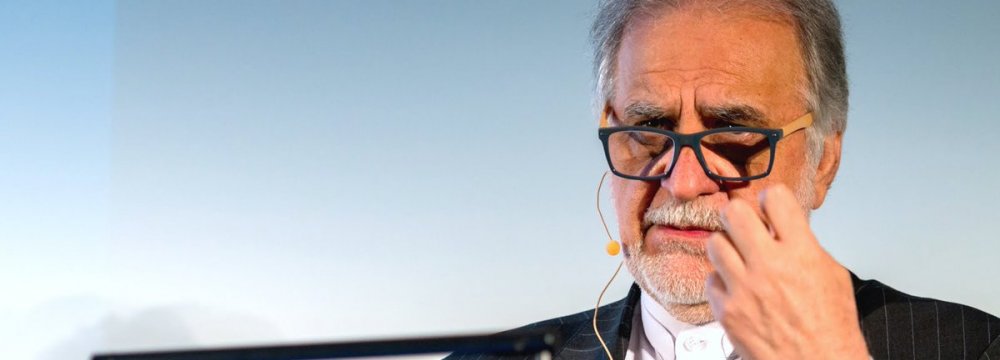
Iran Seeks $50b in Mining Investment Over 5 Years

“We are in need of $50 billion for investment in the mining and mining industries of Iran,” Mehdi Karbasian also told Reuters, speaking on the sidelines of the IMARC Mining Conference in Melbourne, Australia.
“In the past two months, we have had agreements with South Korea, with Austria, with Denmark and it’s on the way for other countries like Germany,” Karbasian said, without identifying the investors.
He said the plan was to attract capital across five years, but declined to say how much Iran had raised so far.
The deputy minister said the country was also looking for partnerships with unspecified foreign miners and manufacturers.
“We are trying our best to find the right investors ... Mines and factories are some of the opportunities for foreign companies to invest.”
As part of Iran’s expansion plans for its resources industry, it is planning to raise its aluminum production to 1.5 million tons annually by 2025 from around 450,000 tons last year. For that, it needs to secure more bauxite resources from overseas.
Karbasian said Iran is in talks with bauxite producers in Australia and Brazil, and will participate in an international bauxite tender in the next two months with its Guinean partner, Societé des Bauxites de Dabola-Tougue (SBDT).
Iran’s state-owned holding company Iranian Mines & Mining Industries Development & Renovation is already the majority investor in SBDT, with 51%, and mine development has picked up since the two nations renewed a 25-year agreement in 2015.
“We are talking to some Australian and Brazilian companies and to other Guinean and Dominican companies as well,” said Karbasian, who is also the chairman of IMIDRO.
Iran is also seeking to increase its copper cathode production to 800,000 tons a year by 2025.
Karbasian said he hoped a change in stance by the United States under president Donald Trump on relations with Iran won’t create headwinds for its investment aim.
Trump said earlier this month that he would not continue to certify the multinational 2015 agreement that lifted sanctions on Iran over its nuclear program and warned that he might ultimately terminate it.
“The Iran sanctions (lifting) was several years back,” the deputy minister said.
“After the agreement happened, it was approved by the United Nations with Iran. It was a green way for working with Iran. We respect this agreement and it’s just Mr. Trump said that he doesn’t like this agreement,” Karbasian said.
The International Atomic Energy Agency’s Director-General Yukiya Amano said on Monday Iran is fulfilling commitments under the nuclear deal with world powers, and UN inspectors are facing no problems in their verification efforts.


Trump weighs using $2 billion in CHIPS Act funding for critical minerals

Codelco cuts 2025 copper forecast after El Teniente mine collapse

Electra converts debt, launches $30M raise to jumpstart stalled cobalt refinery

Barrick’s Reko Diq in line for $410M ADB backing

Abcourt readies Sleeping Giant mill to pour first gold since 2014

Nevada army depot to serve as base for first US strategic minerals stockpile

SQM boosts lithium supply plans as prices flick higher

Viridis unveils 200Mt initial reserve for Brazil rare earth project

Tailings could meet much of US critical mineral demand – study

Kyrgyzstan kicks off underground gold mining at Kumtor

Kyrgyzstan kicks off underground gold mining at Kumtor

KoBold Metals granted lithium exploration rights in Congo

Freeport Indonesia to wrap up Gresik plant repairs by early September

Energy Fuels soars on Vulcan Elements partnership

Northern Dynasty sticks to proposal in battle to lift Pebble mine veto

Giustra-backed mining firm teams up with informal miners in Colombia

Critical Metals signs agreement to supply rare earth to US government-funded facility

China extends rare earth controls to imported material

Galan Lithium proceeds with $13M financing for Argentina project

Kyrgyzstan kicks off underground gold mining at Kumtor

Freeport Indonesia to wrap up Gresik plant repairs by early September

Energy Fuels soars on Vulcan Elements partnership

Northern Dynasty sticks to proposal in battle to lift Pebble mine veto

Giustra-backed mining firm teams up with informal miners in Colombia

Critical Metals signs agreement to supply rare earth to US government-funded facility

China extends rare earth controls to imported material

Galan Lithium proceeds with $13M financing for Argentina project

Silver price touches $39 as market weighs rate cut outlook

















